Case Study: School Health in Cambodia
Background of the project and introduction of activities
Due to past wars in Cambodia, the number of doctors, teachers, lawyers, nurses, and other professionals was small even after the peace agreement because they were killed during the Pol Pot regime. There are no lights in classrooms of elementary schools which were used as internment camps. We are now working to recover the lag of education and health field.
From March 2017 to February 2020, Kagawa University received the support from Japan International Cooperation Agency (JICA) “Grassroots Technical Cooperation Project” in Regional Special Assistance Framework. We have been working to improve health education in Kandalstan County, Kandal Province in the “Project for the Establishment of a School Health System” in cooperation with the Ministry of Education, Youth and Sports of Cambodia in collaboration with Kagawa Prefecture and local NGOs.
In this project, we carry out promotion activities through long-term dispatch of the University’s part-time staff, the training for government staff and educators in Japan, and the follow-up seminars after the training. In addition, the project has published the first “School Health Textbook” in Cambodia, which has been approved as supplementary material by the Ministry of Education and Youth and Sports, and appeal to the government for the infrastructure improvement by constructing the models of toilet and washroom. The government has also formulated measures to allocate health staff at elementary and junior high schools nationwide from 2020 based on the Kagawa University health room system model. In addition, toilets and washrooms were constructed at two local elementary schools.
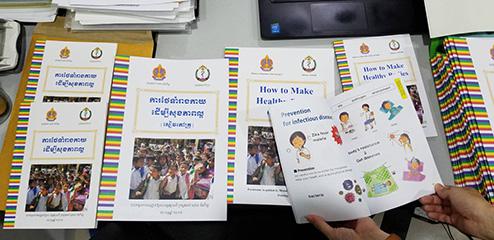
School health textbook approved by Ministry of Education and Youth and Sports (Primary 1st to 6th grade) |
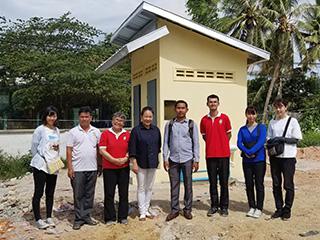
Construction of Toilet by utilizing cloud funding at TranpainVeng Primary School in Kandal Steung county, Kandal province |
Based on the background, the project received the support from “Diversity Collaborative Research Program”, a project to support science and technology human resources development expenditure in 2018. Dr. So Chhavyroth, Deputy Director of the School and Health Affairs Bureau, Ministry of Education and Youth of Cambodia, and Dr. Hak Sithan, Deputy Director of the Medical Bureau were invited to provide school health training. In addition, to promote cooperation between the Ministry of Education, Youth and Sports and the Ministry of Health, the project conducted a local needs survey for adjusting Japanese-style health teachers to Cambodia, and provided supports to establish the collaboration system between the Ministry of Health and the Ministry of Education to train Cambodian health teachers. Construction support was provided. These efforts were also supported and implemented as 2018 EDU-Port Japan Supported Project.
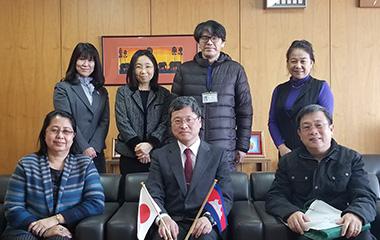
Visit to Dr.Ueda, director of medical faculty |
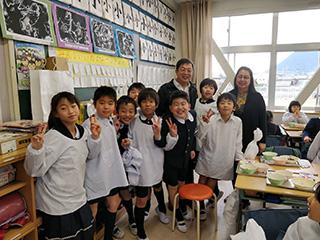
Observation of school lunch at primary school |
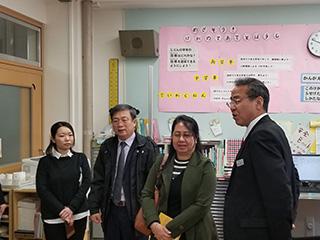
Observation of health room at primary school |
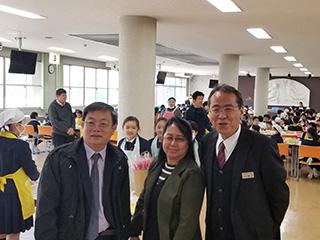
Observation of school lunch in different grade group at primary school |
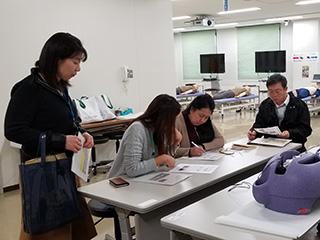
Hygiene education training at skills laboratory |
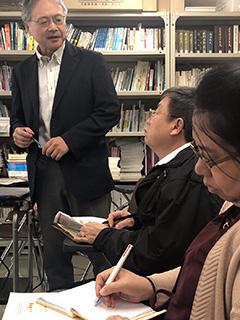
Lecture on public health |
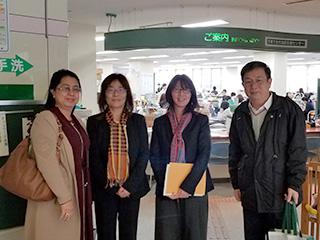
Health policy observation at Takamatsu City Health Center |
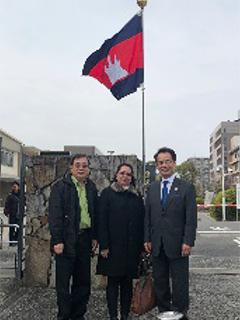
Together with the Vice President at the front gate |
Specific examples and results of activities this year
In 2019, we will conduct a school health checkup training with the aim of strengthening the “building of a health room system” in the JICA Grassroots Technical Cooperation Project, and we will provide proposals for a future school health policy in Cambodia.
Under the academic exchange agreement concluded between Kagawa University and the University of Health and Science of Cambodia (UHS), School dental checkups and school internal checkups will be conducted with government officials, university officials, and local elementary school teachers in October 2019 at UHS, an elementary school in Phnom Penh City, and an elementary school in Kandalstan County, Kandal Province.
The good points of Japanese education, and lessons learned from Cambodia
The reason why we focus on the technical transfer of health education in Cambodia is that the curriculum for training nursing teachers in Japan is a profession that links two disciplines, the Faculty of Education and the Faculty of Medicine (Faculty of Nursing), which are not found in other countries. Furthermore, even though they are teachers, they do not evaluate children. We know the significance of fostering a wonderful occupation to support the development of children from the aspects of school safety, hygiene, and health from the standpoint of children. I think this is the knowledge of Japanese universities that can be shared to protect the health of vulnerable children, especially in poor countries.
In Cambodia, many intellectuals have been killed, and there are many women who are in the position of senior officials such as Deputy Minister at the age of 39. At least, many government officials related in school health are women. Given this situation, Cambodian women commented that Japan was lagging in SDGs, Goal 5: Achieve gender equality and empower all women and girls. It made me think about Japanese gender issues.
Future aspirations
I feel that the issue today is the domestic economic inequality in developing and conflict-affected countries. In Cambodia, people live in fine apartments and the food and clothing are being filled in the heart of Phnom Penh. However, in suburbs and rural areas where public transport is still inadequate, there are disparities in clothing and economy. In particular, the gap between those operating in the dollar and those operating in the local currency, Riel, is significant.
In our project, we measured the height and weight of children at private elementary schools in Phnom Penh and elementary schools in Kandalstan County, a 40-minute drive from the city. There was a significant difference that the development was better in Phnom Penh city. The disparity in the size of children in the country is a major issue for the country, and we hope to see the government’s development of school health policy. We would like to support the development of educational human resources, particularly related to the training of school health human resources in the future.
(2018 EDU-Port Supported Project: Kagawa University)







